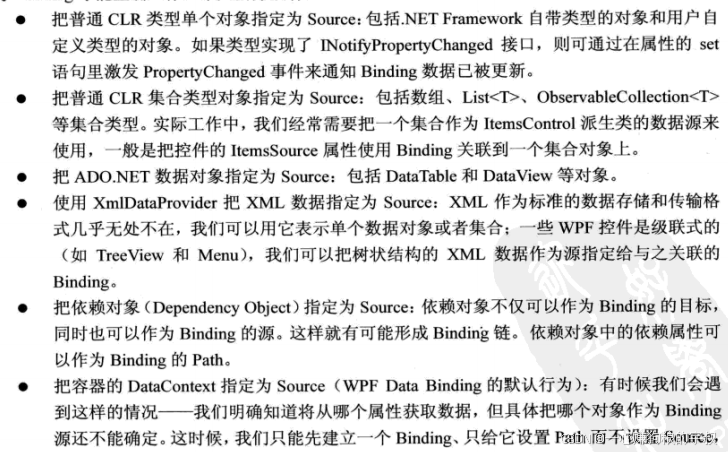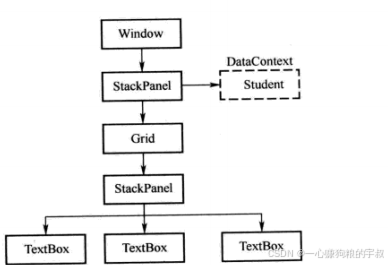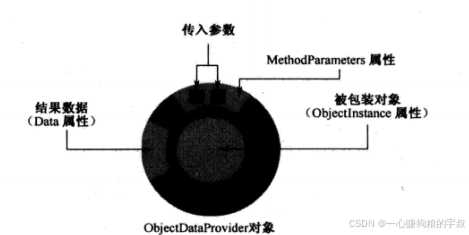《深入浅出WPF》读书笔记.6binding系统(中)
背景
这章主要讲各种模式的数据源和目标的绑定。
代码
把控件作为Binding源与Binding标记扩展
方便UI元素之间进行关联互动
cs
<Window x:Class="BindingSysDemo.BindingEle"
xmlns="http://schemas.microsoft.com/winfx/2006/xaml/presentation"
xmlns:x="http://schemas.microsoft.com/winfx/2006/xaml"
xmlns:d="http://schemas.microsoft.com/expression/blend/2008"
xmlns:mc="http://schemas.openxmlformats.org/markup-compatibility/2006"
xmlns:local="clr-namespace:BindingSysDemo"
mc:Ignorable="d"
Title="BindingEle" Height="300" Width="400">
<Grid>
<Canvas>
<TextBox x:Name="tb1" Text="{Binding ElementName=slider1, Path=Value, Mode=TwoWay, UpdateSourceTrigger=PropertyChanged}" Width="200"
Canvas.Left="100" Canvas.Top="117" HorizontalAlignment="Center" VerticalAlignment="Top"></TextBox>
<Slider x:Name="slider1" Maximum="100" Minimum="0" Canvas.Left="100" Canvas.Top="142" Width="200"
RenderTransformOrigin="0.5,-0.069" HorizontalAlignment="Center" VerticalAlignment="Top"
Value="50"/>
<Button x:Name="btn" Content="失去焦点" Width="120" Canvas.Left="140" Canvas.Top="165"></Button>
</Canvas>
</Grid>
</Window>控制Binding的方向及数据更新
Mode:
TwoWay:双向
OneWay:单向(source到target)
OneTime:一次(source到target)
OneWayToSource:单向(Target到source)
Default:看情况随机调整
Binding的路径(Path)
使用binding path来指定所关注的属性值
cs
<Window x:Class="BindingSysDemo.ListPathDemo"
xmlns="http://schemas.microsoft.com/winfx/2006/xaml/presentation"
xmlns:x="http://schemas.microsoft.com/winfx/2006/xaml"
xmlns:d="http://schemas.microsoft.com/expression/blend/2008"
xmlns:mc="http://schemas.openxmlformats.org/markup-compatibility/2006"
xmlns:local="clr-namespace:BindingSysDemo"QA
xmlns:sys="clr-namespace:System;assembly=mscorlib"
mc:Ignorable="d"
Title="ListPathDemo" Height="300" Width="400">
<Grid>
<StackPanel>
<StackPanel.Resources>
<sys:String x:Key="myStr">
菩提本无树,明镜亦非台
</sys:String>
</StackPanel.Resources>
<TextBox x:Name="tb1"></TextBox>
<TextBox x:Name="tb2"></TextBox>
<TextBox x:Name="tb3"></TextBox>
<TextBox x:Name="tbNopath" Text="{Binding Path=.,Source={StaticResource ResourceKey=myStr}}"></TextBox>
</StackPanel>
</Grid>
</Window>
cs
using System;
using System.Collections.Generic;
using System.Linq;
using System.Text;
using System.Threading.Tasks;
using System.Windows;
using System.Windows.Controls;
using System.Windows.Data;
using System.Windows.Documents;
using System.Windows.Input;
using System.Windows.Media;
using System.Windows.Media.Imaging;
using System.Windows.Shapes;
namespace BindingSysDemo
{
/// <summary>
/// ListPathDemo.xaml 的交互逻辑
/// </summary>
public partial class ListPathDemo : Window
{
public ListPathDemo()
{
InitializeComponent();
//List<string> strList = new List<string>() { "Tim", "Tom", "John" };
//this.tb1.SetBinding(TextBox.TextProperty, new Binding("/") { Source = strList });
//this.tb2.SetBinding(TextBox.TextProperty, new Binding("/Length") { Source = strList, Mode = BindingMode.OneWay });
//this.tb3.SetBinding(TextBox.TextProperty, new Binding("/[2]") { Source = strList, Mode = BindingMode.OneWay });
List<Country> countryList = new List<Country>(){new Country()
{
Name = "美国",
ProvinceList = new List<Province> { new Province { Name="德克萨斯洲",CityList=new List<City>
{
new City{Name="纽约"},
new City{Name="哈萨克"}
} } }
} };
this.tb1.SetBinding(TextBox.TextProperty, new Binding("/Name") { Source = countryList });
this.tb2.SetBinding(TextBox.TextProperty, new Binding("/ProvinceList/Name") { Source = countryList, Mode = BindingMode.OneWay });
this.tb3.SetBinding(TextBox.TextProperty, new Binding("/ProvinceList/CityList/Name") { Source = countryList, Mode = BindingMode.OneWay });
}
}
class City
{
public string Name { get; set; }
}
class Province
{
public string Name { get; set; }
public List<City> CityList { get; set; }
}
class Country
{
public string Name { get; set; }
public List<Province> ProvinceList { get; set; }
}
}"没有Path"的Binding
binding源本身就是数据,Path=.指定自身
cs
<Window x:Class="BindingSysDemo.ListPathDemo"
xmlns="http://schemas.microsoft.com/winfx/2006/xaml/presentation"
xmlns:x="http://schemas.microsoft.com/winfx/2006/xaml"
xmlns:d="http://schemas.microsoft.com/expression/blend/2008"
xmlns:mc="http://schemas.openxmlformats.org/markup-compatibility/2006"
xmlns:local="clr-namespace:BindingSysDemo"
xmlns:sys="clr-namespace:System;assembly=mscorlib"
mc:Ignorable="d"
Title="ListPathDemo" Height="300" Width="400">
<Grid>
<StackPanel>
<StackPanel.Resources>
<sys:String x:Key="myStr">
菩提本无树,明镜亦非台
</sys:String>
</StackPanel.Resources>
<TextBox x:Name="tb1"></TextBox>
<TextBox x:Name="tb2"></TextBox>
<TextBox x:Name="tb3"></TextBox>
<TextBox x:Name="tbNopath" Text="{Binding Path=.,Source={StaticResource ResourceKey=myStr}}"></TextBox>
</StackPanel>
</Grid>
</Window>为Binding指定源(Source)的几种方法

没有Source的BindingDatataContext作为Binding的源
DataContext做为依赖属性当控件底层元素没有设置dataconetxt时会向下传递。看起来像在一层一层向上找。

cs
<Window x:Class="BindingSysDemo.DataContextDemo"
xmlns="http://schemas.microsoft.com/winfx/2006/xaml/presentation"
xmlns:x="http://schemas.microsoft.com/winfx/2006/xaml"
xmlns:d="http://schemas.microsoft.com/expression/blend/2008"
xmlns:mc="http://schemas.openxmlformats.org/markup-compatibility/2006"
xmlns:local="clr-namespace:BindingSysDemo"
mc:Ignorable="d"
Title="DataContextDemo" Height="300" Width="400">
<StackPanel Background="LightBlue">
<StackPanel.DataContext>
<local:Employee Id="1" Age="20" Name="Jack"></local:Employee>
</StackPanel.DataContext>
<Grid>
<StackPanel>
<TextBox Text="{Binding Path=Id}" Margin="5"></TextBox>
<TextBox Text="{Binding Path=Name}" Margin="5"></TextBox>
<TextBox Text="{Binding Path=Age}" Margin="5"></TextBox>
</StackPanel>
</Grid>
</StackPanel>
</Window>使用集合对象作为列表控件的 ItemsSource
在使用集合类型作为列表控件的ItemsSource 时一般会考虑使用ObservableCollection<T>代替
List<T>,因为ObservableCollection<T>类实现了INotifyCollectionChanged和INotifyPropertyChanged接口,能把集合的变化
立刻通知显示它的列表控件,改变会立刻显现出来,
cs
<Window x:Class="BindingSysDemo.ItemSourceDemo"
xmlns="http://schemas.microsoft.com/winfx/2006/xaml/presentation"
xmlns:x="http://schemas.microsoft.com/winfx/2006/xaml"
xmlns:d="http://schemas.microsoft.com/expression/blend/2008"
xmlns:mc="http://schemas.openxmlformats.org/markup-compatibility/2006"
xmlns:local="clr-namespace:BindingSysDemo"
mc:Ignorable="d"
Title="ItemSourceDemo" Height="300" Width="400">
<Grid>
<StackPanel x:Name="sp1" Background="LightBlue">
<TextBlock Text="Employee ID:" Margin="5"></TextBlock>
<TextBox x:Name="tbId" Margin="5"></TextBox>
<TextBlock x:Name="tblId" Margin="5" Text="Employee List:"></TextBlock>
<ListBox x:Name="listBoxEmployee" Height="150" Margin="5">
<!--在xaml中适用DataTemplate-->
<ListBox.ItemTemplate>
<DataTemplate>
<StackPanel Orientation="Horizontal">
<TextBlock Text="{Binding Path=Id}" Width="120"></TextBlock>
<TextBlock Text="{Binding Path=Name}" Width="120"></TextBlock>
<TextBlock Text="{Binding Path=Age}" Width="120"></TextBlock>
</StackPanel>
</DataTemplate>
</ListBox.ItemTemplate>
</ListBox>
</StackPanel>
</Grid>
</Window>
cs
using System;
using System.Collections.Generic;
using System.Linq;
using System.Text;
using System.Threading.Tasks;
using System.Windows;
using System.Windows.Controls;
using System.Windows.Data;
using System.Windows.Documents;
using System.Windows.Input;
using System.Windows.Media;
using System.Windows.Media.Imaging;
using System.Windows.Shapes;
namespace BindingSysDemo
{
/// <summary>
/// ItemSourceDemo.xaml 的交互逻辑
/// </summary>
public partial class ItemSourceDemo : Window
{
public ItemSourceDemo()
{
InitializeComponent();
List<Employee> employees = new List<Employee>()
{
new Employee(){Id=1,Name="Tom",Age="20" },
new Employee(){Id=2,Name="Shoyn",Age="20" },
new Employee(){Id=3,Name="Timi",Age="20" },
new Employee(){Id=4,Name="Jack",Age="20" }
};
this.listBoxEmployee.ItemsSource = employees;
//在listBox获取ItemsSource后会以DisplayMemberPath创建binding
//this.listBoxEmployee.DisplayMemberPath = "Name";
Binding binding = new Binding("SelectedItem.Id") { Source = this.listBoxEmployee,
Mode = BindingMode.OneWay, UpdateSourceTrigger = UpdateSourceTrigger.PropertyChanged };
this.tbId.SetBinding(TextBox.TextProperty, binding);
}
}
}使用ADO.NET对象作为Binding的源
正常使用dataview用来binding,当datatable放在datacontext中时,可以自动选找到datable的defaultview进行绑定
cs
<Window x:Class="BindingSysDemo.DatatableDemo"
xmlns="http://schemas.microsoft.com/winfx/2006/xaml/presentation"
xmlns:x="http://schemas.microsoft.com/winfx/2006/xaml"
xmlns:d="http://schemas.microsoft.com/expression/blend/2008"
xmlns:mc="http://schemas.openxmlformats.org/markup-compatibility/2006"
xmlns:local="clr-namespace:BindingSysDemo"
mc:Ignorable="d"
Title="DatatableDemo" Height="300" Width="400">
<Grid>
<StackPanel Background="AliceBlue">
<ListView x:Name="listView1" Height="250" Margin="5">
<ListView.View>
<GridView>
<GridViewColumn Header="Id" Width="80" DisplayMemberBinding="{Binding Id}"></GridViewColumn>
<GridViewColumn Header="Name" Width="80" DisplayMemberBinding="{Binding Name}"></GridViewColumn>
<GridViewColumn Header="Age" Width="80" DisplayMemberBinding="{Binding Age}"></GridViewColumn>
</GridView>
</ListView.View>
</ListView>
<Button x:Name="btn1" Click="btn1_Click" Content="点击一下" Width="120"></Button>
</StackPanel>
</Grid>
</Window>
cs
using System;
using System.Collections.Generic;
using System.Data;
using System.Linq;
using System.Text;
using System.Threading.Tasks;
using System.Windows;
using System.Windows.Controls;
using System.Windows.Data;
using System.Windows.Documents;
using System.Windows.Input;
using System.Windows.Media;
using System.Windows.Media.Imaging;
using System.Windows.Shapes;
namespace BindingSysDemo
{
/// <summary>
/// DatatableDemo.xaml 的交互逻辑
/// </summary>
public partial class DatatableDemo : Window
{
public DatatableDemo()
{
InitializeComponent();
}
private void btn1_Click(object sender, RoutedEventArgs e)
{
DataTable dt = new DataTable();
dt.Columns.Add("Id", typeof(int));
dt.Columns.Add("Name", typeof(string));
dt.Columns.Add("Age", typeof(string));
for (int i = 0; i < 5; i++)
{
DataRow dataRow = dt.NewRow();
dataRow["Id"] = i;
dataRow["Name"] = "Name" + i.ToString();
dataRow["Age"] = 20 + i;
dt.Rows.Add(dataRow);
}
this.listView1.ItemsSource = dt.DefaultView;
this.listView1.DisplayMemberPath = "Name";
}
}
}使用XML数据作为Binding的源
使用xpath而不是path
cs
<Window x:Class="BindingSysDemo.XmlSourceBindingDemo"
xmlns="http://schemas.microsoft.com/winfx/2006/xaml/presentation"
xmlns:x="http://schemas.microsoft.com/winfx/2006/xaml"
xmlns:d="http://schemas.microsoft.com/expression/blend/2008"
xmlns:mc="http://schemas.openxmlformats.org/markup-compatibility/2006"
xmlns:local="clr-namespace:BindingSysDemo"
mc:Ignorable="d"
Title="XmlSourceBindingDemo" Height="400" Width="400">
<StackPanel>
<ListView x:Name="listView1" Height="300" Margin="5">
<ListView.View>
<GridView>
<!--@Id表示xml元素的attribute Id Name则代表子级元素 -->
<GridViewColumn Header="Id" Width="120" DisplayMemberBinding="{Binding XPath=@Id}"></GridViewColumn>
<GridViewColumn Header="Name" Width="120" DisplayMemberBinding="{Binding XPath=Name}"></GridViewColumn>
</GridView>
</ListView.View>
</ListView>
<Button x:Name="btn1" Content="添加数据" Width="120" Click="btn1_Click"></Button>
</StackPanel>
</Window>
cs
using System;
using System.Collections.Generic;
using System.Linq;
using System.Text;
using System.Threading.Tasks;
using System.Windows;
using System.Windows.Controls;
using System.Windows.Data;
using System.Windows.Documents;
using System.Windows.Input;
using System.Windows.Media;
using System.Windows.Media.Imaging;
using System.Windows.Shapes;
using System.Xml;
namespace BindingSysDemo
{
/// <summary>
/// XmlSourceBindingDemo.xaml 的交互逻辑
/// </summary>
public partial class XmlSourceBindingDemo : Window
{
public XmlSourceBindingDemo()
{
InitializeComponent();
}
private void btn1_Click(object sender, RoutedEventArgs e)
{
XmlDocument xmlDocument = new XmlDocument();
string xmlPath = AppDomain.CurrentDomain.BaseDirectory + "StudentList.xml";
xmlDocument.Load(xmlPath);
XmlDataProvider xdp = new XmlDataProvider();
//xdp.Document = xmlDocument;
xdp.Source=new Uri(xmlPath);
xdp.XPath = @"/StudentList/Student";
this.listView1.DataContext = xdp;
this.listView1.SetBinding(ListView.ItemsSourceProperty, new Binding());
}
}
}
XML
<?xml version="1.0" encoding="utf-8" ?>
<StudentList>
<Student Id="1">
<Name>Tom</Name>
<Age>20</Age>
</Student>
<Student Id="2">
<Name>Tim</Name>
<Age>20</Age>
</Student>
<Student Id="3">
<Name>Jack</Name>
<Age>20</Age>
</Student>
<Student Id="4">
<Name>john</Name>
<Age>20</Age>
</Student>
<Student Id="5">
<Name>Mark</Name>
<Age>20</Age>
</Student>
</StudentList>层级结构
cs
<Window x:Class="BindingSysDemo.HierarchicalDataTplDemo"
xmlns="http://schemas.microsoft.com/winfx/2006/xaml/presentation"
xmlns:x="http://schemas.microsoft.com/winfx/2006/xaml"
xmlns:d="http://schemas.microsoft.com/expression/blend/2008"
xmlns:mc="http://schemas.openxmlformats.org/markup-compatibility/2006"
xmlns:local="clr-namespace:BindingSysDemo"
mc:Ignorable="d"
Title="HierarchicalDataTplDemo" Height="400" Width="400">
<Window.Resources>
<XmlDataProvider x:Key="xdp" XPath="FileSystem/Forder">
<x:XData>
<FileSystem xmlns="">
<Forder Name="Books">
<Forder Name="Programming">
<Forder Name="Windows">
<Forder Name="WPF"></Forder>
<Forder Name="MFC"></Forder>
<Forder Name="Dephi"></Forder>
</Forder>
</Forder>
<Forder Name="Tools">
<Forder Name="Developmentg"></Forder>
<Forder Name="Designment"></Forder>
<Forder Name="Players"></Forder>
</Forder>
</Forder>
</FileSystem>
</x:XData>
</XmlDataProvider>
</Window.Resources>
<Grid>
<TreeView ItemsSource="{Binding Source={StaticResource xdp}}">
<TreeView.ItemTemplate>
<HierarchicalDataTemplate ItemsSource="{Binding XPath=Forder}">
<TextBlock Text="{Binding XPath=@Name}"></TextBlock>
</HierarchicalDataTemplate>
</TreeView.ItemTemplate>
</TreeView>
</Grid>
</Window>使用LINQ检查结果作为Binding的源
cs
<Window x:Class="BindingSysDemo.LinqBindingDemo"
xmlns="http://schemas.microsoft.com/winfx/2006/xaml/presentation"
xmlns:x="http://schemas.microsoft.com/winfx/2006/xaml"
xmlns:d="http://schemas.microsoft.com/expression/blend/2008"
xmlns:mc="http://schemas.openxmlformats.org/markup-compatibility/2006"
xmlns:local="clr-namespace:BindingSysDemo"
mc:Ignorable="d"
Title="LinqBindingDemo" Height="400" Width="400">
<Grid>
<StackPanel Background="AliceBlue">
<ListView x:Name="listView1" Height="250" Margin="5">
<ListView.View>
<GridView>
<GridViewColumn Header="Id" Width="80" DisplayMemberBinding="{Binding Id}"></GridViewColumn>
<GridViewColumn Header="Name" Width="80" DisplayMemberBinding="{Binding Name}"></GridViewColumn>
<GridViewColumn Header="Age" Width="80" DisplayMemberBinding="{Binding Age}"></GridViewColumn>
</GridView>
</ListView.View>
</ListView>
<Button x:Name="btn1" Click="btn1_Click" Content="点击一下" Width="120"></Button>
</StackPanel>
</Grid>
</Window>
cs
using System;
using System.Collections.Generic;
using System.Linq;
using System.Text;
using System.Threading.Tasks;
using System.Windows;
using System.Windows.Controls;
using System.Windows.Data;
using System.Windows.Documents;
using System.Windows.Input;
using System.Windows.Media;
using System.Windows.Media.Imaging;
using System.Windows.Shapes;
using System.Xml;
using System.Xml.Linq;
namespace BindingSysDemo
{
/// <summary>
/// LinqBindingDemo.xaml 的交互逻辑
/// </summary>
public partial class LinqBindingDemo : Window
{
public LinqBindingDemo()
{
InitializeComponent();
}
private void btn1_Click(object sender, RoutedEventArgs e)
{
//操作List
//List<Employee> employees = new List<Employee>()
//{
// new Employee(){Id=1,Name="Tom",Age="20" },
// new Employee(){Id=2,Name="Shoyn",Age="20" },
// new Employee(){Id=3,Name="Timi",Age="20" },
// new Employee(){Id=4,Name="Jack",Age="20" }
//};
//this.listView1.ItemsSource = from stu in employees where stu.Name.Contains("T") select stu;
XDocument xmlDoc = XDocument.Load(AppDomain.CurrentDomain.BaseDirectory + "StudentList2.xml");
//适用linq操作xml Descendants可以跨越层级
this.listView1.ItemsSource = from eml in xmlDoc.Descendants("Student")
where eml.Attribute("Name").Value.StartsWith("T")
select new Employee
{
Id = int.Parse(eml.Attribute("Id").Value),
Name = eml.Attribute("Name").Value,
Age = eml.Attribute("Age").Value
};
}
}
}使用ObjectDataProvider对象作为Binding的Source
当不想暴漏类对象的全部属性值,或者想使用方法返回值作为绑定值时

cs
<Window x:Class="BindingSysDemo.ObjectDataProviderDemo"
xmlns="http://schemas.microsoft.com/winfx/2006/xaml/presentation"
xmlns:x="http://schemas.microsoft.com/winfx/2006/xaml"
xmlns:d="http://schemas.microsoft.com/expression/blend/2008"
xmlns:mc="http://schemas.openxmlformats.org/markup-compatibility/2006"
xmlns:local="clr-namespace:BindingSysDemo"
mc:Ignorable="d"
Title="ObjectDataProviderDemo" Height="400" Width="400">
<StackPanel Background="AliceBlue">
<TextBox x:Name="tbArg1" Margin="5"></TextBox>
<TextBox x:Name="tbArg2" Margin="5"></TextBox>
<TextBox x:Name="tbRes" Margin="5"></TextBox>
</StackPanel>
</Window>
cs
using System;
using System.Collections.Generic;
using System.Linq;
using System.Text;
using System.Threading.Tasks;
using System.Windows;
using System.Windows.Controls;
using System.Windows.Data;
using System.Windows.Documents;
using System.Windows.Input;
using System.Windows.Media;
using System.Windows.Media.Imaging;
using System.Windows.Shapes;
namespace BindingSysDemo
{
/// <summary>
/// ObjectDataProviderDemo.xaml 的交互逻辑
/// 当只想暴漏部分属性的时候
/// </summary>
public partial class ObjectDataProviderDemo : Window
{
public ObjectDataProviderDemo()
{
InitializeComponent();
this.SetBinding();
}
private void SetBinding()
{
ObjectDataProvider odp = new ObjectDataProvider();
//让ObjectDataProvider自行创建对象
//odp.ObjectType = typeof(Calculator);
odp.ObjectInstance = new Calculator();
odp.MethodName = "Add";
//ObjectDataProvider通过参数数量来区分重载方法
//MethodParameters并非依赖属性
odp.MethodParameters.Add("0");
odp.MethodParameters.Add("0");
Binding binding2Arg1 = new Binding("MethodParameters[0]")
{
Source = odp,
//直接写若obp对象而不是Calculator
BindsDirectlyToSource = true,
UpdateSourceTrigger = UpdateSourceTrigger.PropertyChanged
};
Binding binding2Arg2 = new Binding("MethodParameters[1]")
{
Source = odp,
BindsDirectlyToSource = true,
UpdateSourceTrigger = UpdateSourceTrigger.PropertyChanged
};
Binding binding2Res = new Binding(".") { Source = odp };
this.tbArg1.SetBinding(TextBox.TextProperty, binding2Arg1);
this.tbArg2.SetBinding(TextBox.TextProperty, binding2Arg2);
this.tbRes.SetBinding(TextBox.TextProperty, binding2Res);
}
}
}
cs
using System;
using System.Collections.Generic;
using System.Linq;
using System.Text;
using System.Threading.Tasks;
namespace BindingSysDemo
{
public class Calculator
{
public string Add(string arg1, string arg2)
{
double x = 0;
double y = 0;
double z = 0;
if (double.TryParse(arg1, out x) && double.TryParse(arg2, out y))
{
z = x + y;
return z.ToString();
}
return "Input Error!";
}
}
}使用Binding的RelativeSource
不确定数据来源,但在UI层级上有关系时使用
cs
<Window x:Class="BindingSysDemo.RelativeSouceDemo"
xmlns="http://schemas.microsoft.com/winfx/2006/xaml/presentation"
xmlns:x="http://schemas.microsoft.com/winfx/2006/xaml"
xmlns:d="http://schemas.microsoft.com/expression/blend/2008"
xmlns:mc="http://schemas.openxmlformats.org/markup-compatibility/2006"
xmlns:local="clr-namespace:BindingSysDemo"
mc:Ignorable="d"
Title="RelativeSouce" Height="400" Width="400">
<Grid x:Name="g1" Background="Red" Margin="10">
<DockPanel x:Name="d1" Background="Orange" Margin="10">
<Grid x:Name="g2" Background="Yellow" Margin="10">
<DockPanel x:Name="d2" Background="LawnGreen" Margin="10">
<TextBox x:Name="tb1" FontSize="24" Margin="10"
Text="{Binding RelativeSource={RelativeSource AncestorLevel=2 ,AncestorType={x:Type Grid}},Path=Name}"></TextBox>
</DockPanel>
</Grid>
</DockPanel>
</Grid>
</Window>
cs
using System;
using System.Collections.Generic;
using System.Linq;
using System.Text;
using System.Threading.Tasks;
using System.Windows;
using System.Windows.Controls;
using System.Windows.Data;
using System.Windows.Documents;
using System.Windows.Input;
using System.Windows.Media;
using System.Windows.Media.Imaging;
using System.Windows.Shapes;
namespace BindingSysDemo
{
/// <summary>
/// RelativeSouce.xaml 的交互逻辑
/// 当不知道source是什么,但清楚其与binding的目标对象有层级关系时
/// </summary>
public partial class RelativeSouceDemo : Window
{
public RelativeSouceDemo()
{
InitializeComponent();
/*RelativeSource rs =new RelativeSource(RelativeSourceMode.FindAncestor);//RelativeSourceMode.Self 绑定自身属性
//从当前层向上找到第二个Grid
rs.AncestorLevel = 2;
rs.AncestorType = typeof(Grid);
Binding binding = new Binding("Name") { RelativeSource = rs };
this.tb1.SetBinding(TextBox.TextProperty, binding);*/
}
}
}git地址
GitHub - wanghuayu-hub2021/WpfBookDemo: 深入浅出WPF的demo
